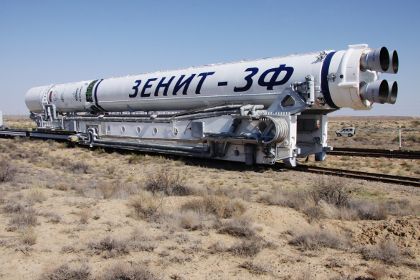Up!
Europos kosmoso agentūra (ESA) trečiadienį pirmąkart paleido eksperimentinį erdvėlaivį iš savo kosmodromo Prancūzijos Gvianoje. Tikimasi, kad šis bandymas atvers kelią pirmosioms Europos daugkartinio naudojimo kosminio transporto sistemoms.
Raketa, nešanti automobilio dydžio ESA erdvėlaivį „Intermediate eXperimental Vehicle“ (IXV), startavo apie 13:30 val. Grinvičo (15:30 val. Lietuvos) laiku, tikimasi, kad kosminė kapsulė maždaug po 100 minučių po starto nusileis Ramiajame vandenyne.
Kieno raketa?
The launch of a new European space plane on Wednesday, Feb. 11, is a rare instance of good news for Ukraine's space industry, which has been increasingly at risk from the grinding conflict with Russia.
Ukraine's state-owned Yuzhnoye Design Bureau helped develop the rocket that carried the European Space Agency's new IXV experimental reentry vehicle from the Kourou launch center in French Guiana. Yuzhnoye, descended from a Soviet-era designer of ballistic missiles, has developed a business supplying rocket technology to Western partners. Its headquarters in the city of Dnepropetrovsk sits less than 150 miles from the fighting in eastern Ukraine. Still, says Oleg Ventskovsky, the company's representative in Brussels, "it's more or less business as usual." The rest of Ukraine's space industry hasn't been so fortunate. Russia was its biggest customer, and sales have cratered. That's partly Ukraine's doing: In June, President Petro Poroshenko halted all military sales to Russia, including some dual-use missile and rocket technologies made by Ukrainian companies. A far bigger blow came earlier this month with Russia's decision to stop buying the mostly Ukrainian-made Zenit rocket, a mainstay of Russian satellite launches since Soviet times. Russia also announced it would end a joint program with Kiev that furnishes Ukrainian-built Dnepr rockets for satellite launches.
The decisions came shortly after President Vladimir Putin reorganized Russia's space program, folding what had been the national space agency into a new state corporation headed by a former auto industry executive. The former chief of the space agency had planned to continue using Ukrainian-built rockets, according to local press reports.
Roscosmos to Reject Ukrainian Rockets!
Russia's action also raises questions about the future of Sea Launch, a company with operations based in Long Beach, Calif., that has used Zenit rockets to launch satellites from a floating platform at sea. Sea Launch was co-founded in the 1990s by Boeing, although it is now controlled by a Russian state company, Energia, following its emergence from bankruptcy in 2010. Energia has decided to replace the Zenit with Russian-made Angara rockets on future launches, according to Russian news media reports.
Russia's action also raises questions about the future of Sea Launch, a company with operations based in Long Beach, Calif., that has used Zenit rockets to launch satellites from a floating platform at sea. Sea Launch was co-founded in the 1990s by Boeing, although it is now controlled by a Russian state company, Energia, following its emergence from bankruptcy in 2010. Energia has decided to replace the Zenit with Russian-made Angara rockets on future launches, according to Russian news media reports.
Ukrainian rocket maker Yuzhmash, which produces both the Zenit and the Dnepr, says it was facing a "catastrophic" situation even before Russia's action. Sales to Russia plummeted from $1.7 billion in 2011 to only $28 million last year, Yuzhmash said in a statement posted on its website last month. The Dnepropetrovsk-based company owes some $140 million in back wages to its 15,000 workers and partially suspended manufacturing operations until late February. The company did not respond to calls from Bloomberg Business.
Not long ago, Ukraine's space industry was a relatively bright spot in an otherwise-bleak economy. Communist-era central planners had designated the country a locus of rocket design and manufacturing. After the breakup of the Soviet Union, some Ukrainian aerospace companies found new markets in the West. Virginia-based Orbital ATK uses Yuzhmash-made components in its Antares launch system, and Ukraine and Brazil have a joint venture that plans to launch Ukrainian-built rockets from a launch site in northeastern Brazil. Yuzhmash also built the fourth-stage engine of the Vega rocket to be used in the Feb. 11 European Space Agency launch.
By 2013, Ukraine's deputy prime minister told the website Space News, the country was making about $600 million a year from commercial space ventures. But Russia still accounted for about 80 percent of sales at Yuzhmash, Vladimir Tkachenko, the company's assistant general manager, told the BBC earlier this month. Yuzhmash, he said, "is in dire need of orders."
In the meantime, local government is trying its best to keep a major bulwark of the Ukrainian space industry afloat—just not with orders for new rockets. Yuzhmash, for one, has received orders for agricultural equipment from Dnepropetrovsk's governor, according to Ventskovsky. Western patrons of the Ukrainian aerospace sector can only watch and wait.
Kokia Valentino diena?
Putin Everywhere!






Komentarų nėra:
Rašyti komentarą